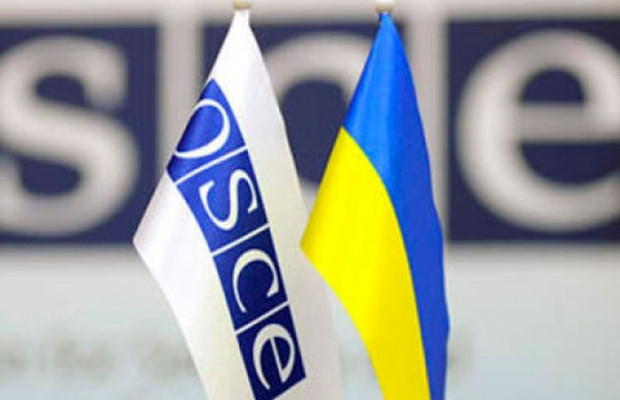
Geneva Agreement and the OSCE: Two Non-Solutions to the Russia-Ukraine Conflict
Publication: Eurasia Daily Monitor Volume: 11 Issue: 85
By:

The April 17 Geneva Statement “on the situation in Ukraine” (by Russia, the United States, the European Union and Ukraine) has proven to be stillborn. This was preordained, since the US side accepted Russia’s definition of the conflict as one “in Ukraine” between local parties, and empowered Russia to be part of a solution to that, instead of recognizing the inter-state nature of this conflict undertaken by Russia against Ukraine. The Geneva Statement came out of Russia-US bilateral negotiations, which Russia had initiated. The EU and the Ukrainian government became add-on signatories (see EDM, April 30, May 1).
Geneva’s failure to “de-escalate” the conflict is now generally recognized, except by signatory Russia, which profits from it. The US White House and State Department have severely criticized Russia for the conflict’s escalation. While thoroughly well-grounded in proven facts, those reproaches go beyond the framework of the joint Geneva Statement, which the US inexplicably negotiated in the way it did, at variance with the US’s own official position. Technically, the Geneva document does not stipulate any specific obligations for Russia. It only envisages certain steps to be taken within Ukraine, as if the conflict were merely internal to that country.
United Nations Secretary General Ban Ki-moon has twice called for a follow-up Geneva conference to determine why the April 17 Statement could not be implemented and to take corrective steps. Unlike the Geneva document, Ban calls for observance of “Ukraine’s unity, sovereignty, and territorial integrity” (Russia had apparently prevailed on the US to omit this from the Geneva Statement). Ban proposes to make use of the UN’s mediation capacities, and offers to mediate himself if necessary (UN press releases, May 3, 5).
The EU, a party to the quadrilateral Geneva format, has urgently initiated a trilateral meeting—EU-Russia-Ukraine—to discuss the crisis. Germany’s foreign affairs minister, Frank-Walter Steinmeier, describes the Geneva Statement as “a paper without implementation provisions,” and proposes a follow-up conference to address the crisis (Die Welt, May 5). Germany has not been a party to the Geneva process thus far (while the collective EU acted as a bit player there). Germany sees its chance to become a leading player in the follow-up to the Geneva process.
While recognizing Geneva’s failure to de-escalate the conflict, the ameliorative proposals share three common flaws.
First, the Geneva Statement is inherently too tilted in Russia’s favor to be taken as the basis for an “improved” document. Moscow is certain to resist such “corrections,” holding fast to the unhoped-for gains it achieved through the existing basic document, thus compromising any follow-up from the outset.
Second, Russia has no interest at this stage to de-escalate, and every interest to escalate, this being the main source of Russia’s leverage on Ukraine and against Western diplomacy. Ukraine and the West have no means or no will to match Russia’s steady escalation. Daily beseeching Moscow to de-escalate communicates those weaknesses and strengthens Russia’s confidence.
Third, the Organization for Security and Cooperation in Europe (OSCE) is seen as a possible panacea to this crisis. However, the OSCE has already compiled a dismal track record on the “frozen conflicts” in Transnistria, South Ossetia, and Karabakh. The OSCE operates under Russia’s veto on political and policy matters within the organization itself. This has enabled Russia and its proxies to manipulate the “frozen” conflicts almost at will. The OSCE has treated the Transnistria and South Ossetia conflicts as internal to Moldova and Georgia, respectively, instead of recognizing the inter-state nature of those conflicts undertaken by Russia against the recognized states, within their borders. OSCE-underwritten negotiation formats equate the secessionist territory with the recognized state as “parties to the conflict” in Georgia and Moldova. In Moldova’s case, the OSCE has at times promoted the country’s “federalization,” which Russia favors in Moldova, as it does in Ukraine.
The OSCE has deployed three distinct missions to Ukraine since the beginning of this crisis. These are:
1) An advance group of the election observation mission for Ukraine’s presidential election, scheduled to be held on May 25. Under the OSCE’s ground rules, this mission is immune to Russia’s veto. Meanwhile, Russia threatens to use its paramilitary proxies to block the holding of that election in Ukraine’s Donbas. During the Geneva negotiations, Russia indicated that it could refrain from disrupting that election, if Ukraine would in return commit to “federalization” in advance of the election.
2) The German-led group of eight OSCE military observers, abducted by the Russian field command in Slovyansk on April 25, released on May 3 and repatriated (see EDM, May 6). This was a one-off inspection visit at Ukraine’s invitation, under the 2011 Vienna Document on Confidence and Security Building Measures (CSBMs) covering armed forces in Europe. That group (which did not include Russians) was to observe Russia’s troop movements from the Ukrainian side of the Ukraine-Russia border. Ukraine had requested a joint session of the OSCE’s Forum for Security Cooperation and the OSCE’s Permanent Council for May 1 in Vienna, to discuss Russia’s troop movements along Ukraine’s borders as well as the plight of the OSCE’s observers held hostage in Slovyansk. However, Russia vetoed the holding of that joint session at the OSCE (Interfax, April 29, 30, May 1).
3) The OSCE’s Special Monitoring Mission, on a six-month renewable mandate, with pronounced political functions. Approved by Russia within the OSCE’s Permanent Council, this special monitoring mission is designed to promote dialogue and negotiation between the Ukrainian government and unspecified representatives of Ukraine’s eastern and southern regions. Based on the Geneva Agreement (see above), Moscow wants to pick itself some putative representatives of those Ukrainian regions, and has already named some “federalists” and outright secessionists for participating in those negotiations. Russia intends to engineer negotiations between Kyiv and putative representatives of eastern Ukraine as co-equal participants, using the OSCE as platform and mediator, and positioning Russia as arbiter, on the “frozen conflicts” model familiar to Russia and the OSCE.




